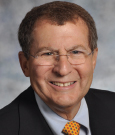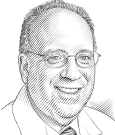Managing older-aged cancer patients represents one of the major challenges to our health-care system. Caring for older cancer patients, with their frequent multiple morbidities and a variable health status, requires special integration of an oncologic and geriatric approach. Moreover, our aging population will pose serious challenges to an already overtaxed cancer delivery system and will intensify the need for oncologists to be optimally trained to manage their older patients. Over the past 20 years, the oncology community has seen the development of geriatric programs and a focus on research in older cancer patients. To shed light on the state of geriatric oncology, The ASCO Post spoke with Hyman Muss, MD, a leader in the field.
Practicing Like ‘Mini-Geriatricians’
During your career in geriatric oncology, what has been the most significant advance?
Older patients, at least in affluent Western countries, are the majority of patients who have cancer, and the numbers are continuing to grow at an explosively high rate. This has led me to conclude that the most important advance in geriatric oncology over the course of my career has been the recognition that older cancer patients need to be managed differently than their younger counterparts. To that end, we all need to learn to do routine geriatric assessments, and as oncologists, learn to practice like mini-geriatricians, factoring all the other health-related baggage common in older patients into our treatment plans.
Now that we’ve gained more knowledge in this area, it’s important that a proper assessment be done so older patients do not get low-balled in treatment decisions. The danger using age in recommending a treatment plan is to deny state-of-the-art treatment to those who deserve it and may benefit from it.
Functional, Not Chronologic Age
Besides a chronologic measure, how do we determine who is a geriatric cancer patient?
When we see an older patient, the primary question we should be asking is not what the patient’s age is, but what is the patient’s life expectancy and how might treatment affect function and quality of life. There are some very good online tools to help in this assessment process. One, ePrognosis (eprognosis.ucsf.edu), is a tool for estimating the life expectancy of elders. It is easy to use, accurate, and a great help for busy clinicians.
I show how ePrognosis works in all my lectures at ASCO meetings. There are several tools that can be used depending upon the status of the patient. The tools require that a few extra questions be asked of the older patient, and then the calculators allow you to get a fairly good picture of your patient’s 5- and 10-year life expectancy—which is essential in determining an appropriate treatment program. Our guesses on life expectancy, even by the most seasoned clinician, are notoriously bad.
There is also an emerging group of predictive models for chemotherapy-related toxicity in which you can input clinical and geriatric information and get an idea of the risk of your patient having grade 3 and higher chemotherapy toxicity. Martine Extermann, MD, PhD, has developed a wonderful model called the Chemotherapy Risk Assessment Scale for High-Age Patients (CRASH). It is specifically designed to score laboratory test values and geriatric assessment parameters besides age, such as functional and nutritional status, comorbidity, cognition, psychological state, and social support, to predict the risk of severe toxicity from chemotherapy in older patients. A similar model, the Cancer and Aging Research Group (CARG) model, has been developed by Arti Hurria, MD.
More Data Needed on Chemoprevention
Is chemoprevention a management tool in geriatric oncology?
Chemoprevention in the elderly cancer patient has little clinical application. And there aren’t enough trials in this area to understand what, if any, cancer chemoprevention strategies may benefit the geriatric population. In elderly patients with a life expectancy of 5 years or more, screening for breast and colorectal cancers may have benefit, but we need more information.
In terms of chemoprevention, what can we really prevent?
For instance, most of the chemoprevention studies with tamoxifen do not show a significant survival benefit, so I think there is no reason to put an older cancer patient on tamoxifen or an aromatase inhibitor, especially considering the side effects. In short, there are no large data sets to prove the benefit of chemoprevention strategies in the elderly, and I certainly wouldn’t go in that direction with my patients. Just like in younger patients, keeping fit and eating a healthy diet is the best advice we can give to prevent cancer and other diseases that increase with aging.
An Educational Opportunity
Since community doctors deliver the majority of cancer care, is there a knowledge gap in the busy community setting about managing the more complex needs of their geriatric patients?
I don’t think either academic or community doctors are up to speed with the special assessment and care of geriatric cancer patients. For instance, we looked within our own institution at the University of North Carolina Lineberger Comprehensive Cancer Center at data we collected about patient falls; we found that almost none of the patients who had a history of falls were referred for physical or occupational therapy evalution, even though these interventions in older patients with falls lower morbidity and mortality. This shows that most doctors think that because most cancer patients are older, we intuitively know how to care for them, but at least in this instance, we didn’t deliver the kind of specialized care needed in this more challenging population.
There are many educational opportunities for doctors to learn more about their older patients. For instance, ASCO has a terrific series of slides on general geriatric care at ASCO University; there are other equally good websites, and I have a series of slides on geriatric oncology on our Lineberger Comprehensive Cancer Center website that can be downloaded. I am always available to colleagues who want to get hold of this valuable information. But the truth is that clinicians simply don’t have the time for extra educational activity. With all the new demands of electronic medical records, meaningful use, other data collection, and paperwork, who wants to go home after a long day in the clinic and begin studying slides on how to do a geriatric assessment? We need to figure out how to get this information into all training programs and make it part of lifelong learning.
Not One-Size-Fits-All Treatment Decisions
One common misconception about older patients that needs changing is that they should always be spared the rigors of aggressive therapy. This attitude is being proved false, but it may be difficult to convince oncologists, because there are so few clinical trials that include the elderly. What’s your opinion on this?
I think the word on the issue of undertreating elderly cancer patients is finally getting out, and both community and academic clinicians are becoming more aware that otherwise healthy older cancer patients deserve state-of-the-art therapies. That said, treating elderly patients, as I’ve mentioned, depends largely on doing thorough and accurate assessments.
For instance, the small potential benefit of chemotherapy is usually unwarranted in an 80-year-old patient with a few positive nodes who has hormone receptor–positive cancer. However, a 75-year-old woman with triple-negative breast cancer who is in otherwise good shape should be treated with the same state-of-the-art therapies as her younger counterpart. Treatment decisions in the elderly are not one-size-fits-all; it is all about patient-by-patient assessment.
Don’t Overlook Early Dementia
Dementia in the elderly patient with cancer is a big challenge. Are we doing a good job meeting that challenge?
No. A clinician must do a cognitive function test in the office to identify patients with dementia. I’ve learned that very few doctors do these tests routinely, quite frankly because it is a time-consuming practice, even though a screen can be done in a few minutes. For example, a well-dressed older person who is articulate when answering yes-or-no questions frequently may not know what she had for breakfast. Early dementia is frequently overlooked. So, you have to probe, and that takes time, but it’s part of geriatric best practices and worth it.
Defining Value and Quality
Any thoughts on how the movement in oncology to value over quantity might affect geriatric oncology, especially in an environment that is growing increasingly sensitive over health-care costs?
The terms “value” and “quality” are variable across the whole spectrum of cancer care. If I can define what value is for my patient, and then we’ll determine whether the cost is worth it for one quality-adjusted year of life. Do you think a 75-year-old retired person who has led a productive life has less value as a human being than a 15-year-old who is incarcerated for drugs? The examples are endless, so definitions of value and cost can be fuzzy and unfair. Quality is another tough one. Is it that I follow national treatment guidelines or have free parking?
Closing Thoughts
Would you like to share any final thoughts?
I am very pleased that so many great cancer organizations are now paying attention to the issues of elderly patients. ASCO, in particular, has been a leader in this field, providing valuable venues for training and education for the oncology community and the younger doctors entering oncology. This is the way forward, which will finally integrate geriatric oncology into our daily practice. ■
Disclosure: Dr. Muss reported no potential conflicts of interest.
Geriatrics for the Oncologist is guest edited by Stuart Lichtman, MD, FACP, FASCO, and developed in collaboration with the International Society of Geriatric Oncology (SIOG). Visit SIOG.org for more on geriatric oncology.



